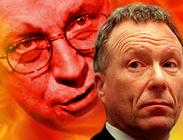Though Cheney was not on trial, his shadow draped the proceedings. Testimony and evidence showed that three months into the Iraq War--when no WMDs were being found and the situation in Iraq was deteriorating--the Vice President took it upon himself to counter Joseph Wilson's criticism of the White House, even before Wilson went public. When Washington Post reporter Walter Pincus was sniffing around in early June 2003 to learn more about an unnamed ambassador who had gone to Niger because of a request from the Vice President, Cheney, after collecting information on his own about Wilson's mission, dictated talking points to Libby. Libby then handed Pincus a semi-cover story: that it had been an aide to Cheney, not the Vice President, who had asked for more intelligence on the Niger charge a year before the war.
After Wilson's op-ed created a stir, Cheney directed Libby to leak selective portions of the National Intelligence Estimate on Iraq's WMDs to Judith Miller at a private breakfast meeting at the St. Regis Hotel on July 8, 2003. Cheney even went to Bush to have the President declassify the NIE for this private leak. This act of automatic executive declassification (known only to Bush, Cheney and Libby) was unprecedented, as Libby later told the grand jury. ....
Corn brings out Cheney the renegade:
During the Libby trial, a clear picture emerged: Cheney ran his own duchy within 1600 Pennsylvania Avenue.
And, how Cheney and Libby were often at odds with Bush's aides, including Karl Rove.
Corn alleges that Ted Wells' decision mid trial not to call Cheney or Karl Rove was aimed at preserving Libby's pardon hopes.
As for what we still don't know:
The public, for example, has not learned how Rove managed to keep his job; what Bush did or did not know about Rove's part in the leak; or what Bush and Cheney told Fitzgerald when he questioned them.





